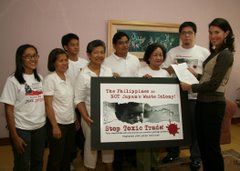Office of Sen. Rodolfo G. Biazon
Press Release
July 17, 2008
Senator Rodolfo G Biazon today said the latest decision of the Supreme Court declaring that Executive Privilege may be invoked in the debates on the JPEPA strains the credibility and impartiality of the Supreme Court.
"The Executive Department transmitted the JPEPA for ratification by the Senate on 17 August 2007. This means that even the Executive agrees to the proposition that the Senate's ratification is required for the agreement to be effective."
The Chairman of the Senate Committee on National Defense and Security cited, "Entering into treaties and agreements is a shared responsibility and authority between the Executive and the Legislature specifically through the ratifying powers of the Senate as provided for in the Constitution's Art VII Sec. 21 "No treaty or agreement shall be valid or effective unless concurred in by at least two-thirds of the members of the
Senate."
"Ratification is a process that would entail public debate. How can public debate be proper if Executive Privilege will be invoked denying the public of certain information which is necessary for public acceptance through the Senate of the proposed treaty or agreement. There can be no public debate if information is withheld from the public."
Biazon said upon examination of the records of the proceedings of the 1987 Constitution, the proceedings clearly requires ratification by the Senate of any treaty or any agreement if any of the three characteristics are present:
1. The treaty or agreement is political in nature;
2. The treaty or agreement is permanent in nature; and
3. The treaty or agreement will require a change in national policies.
According to Article 4 of the JPEPA (page 14) "Each party shall examine the possibility of amending or repealing laws and regulations that pertain to or affect the implementation and operation of this Agreement, if the circumstances or objectives giving rise to their adoption no longer exists or if such circumstances or objectives can be addressed in a less trade-restrictive manner."
Biazon said the possibility of repealing or amending existing statues definitely is a change in national policy.
"JPEPA is permanent in nature. Once the Philippines ratifies the said treaty, it is binding upon the parties and must be performed by the parties in good faith. A treaty under international law, being an agreement entered into by states or international organizations must take into consideration the principle of "pacta sunt servanda" or pacts must be respected, " Biazon emphasized.
Biazon concluded, " I believe the Senate, the repository of the ratifying power of the government must examine this development and take appropriate action such as getting involved in the filing of a motion for reconsideration of the decision."
Sunday, July 20, 2008
Subscribe to:
Post Comments (Atom)






No comments:
Post a Comment